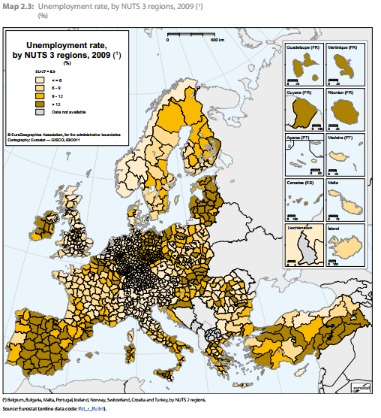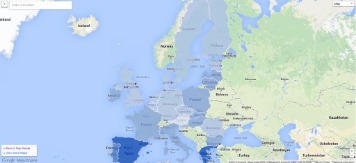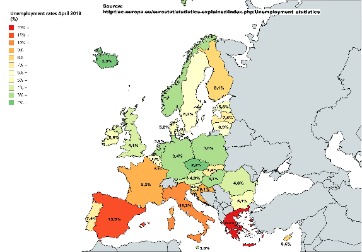Unemployment Rate In Europe
Table of Contents Heading
- Unemployment Rates In Europe
- Unemployment Rate In Eu Countries July 2020
- This Page Displays A Table With Actual Values, Consensus Figures, Forecasts, Statistics And Historical Data Charts For
- Substaintial Unemployment Rate Decreases: Greece, Cyprus, Bulgaria, Spain, And Croatia
- Map Of Moodys Credit Ratings For Europe 2020
- Unemployment Data For Non
- Why Such Disparity Between Unemployment Rates In Europe?
- Labour: Labour Market Statistics
A genetic algorithm is developed to forecast the relative presence of different profiles in Spain’s unemployed population. A selection operator is defined that assumes that the higher the unemployment rate of a profile, the higher the probability that such a profile is present in future populations. A transition matrix takes other factors into account which may influence changes in the profiles. The algorithm is applied to the original quarterly populations of Spain’s unemployed in 2014.

Across 14 EU nations surveyed by the Center this year, a median of 54% of adults say they are pessimistic about the future availability of well-paying jobs in their country, ranging from just 28% who say this in Sweden to 76% in Spain and 80% in Greece. Yet, today Irish unemployment stands at 5.3%, a shade above the UK level, and Portugal’s at 7.3% with Lisbon appealing to nurses and other Portuguese workers in Brexit Britain to return home as labour shortages are appearing. Romania, Bulgaria and Estonia have lower unemployment than the EU’s three Nordic member states – Denmark, Sweden and Finland – that are often held up by progressives as labour market models to follow and emulate. Greece is topping this chart because of the high amount of debt that it has. In 2011 alone, Greece was handed a bailout sum to the tune of €109 billion because of fears of loan defaults. Credit rating firms have also termed Greece as a high-risk area, which has shied investors away from the nation. In turn, this has adversely affected the economy to the level that there are virtually no opportunities.
Unemployment Rates In Europe
The unemployment rate is least persistent in Hungary and Slovenia, more persistent in the Czech Republic, Slovakia and the Baltic States and extremely persistent in Poland. The degree of persistence appears to reflect the different levels of economic and institutional development in the countries and possibly also the role of the government. In this paper we have examined the unemployment rate series in Turkey by using long memory models and in particular employing fractionally integrated techniques. Our results suggest that unemployment in Turkey is highly persistent, with orders of integration equal to or higher than 1 in the majority of the cases. This implies lack of mean reversion and persistence of the shocks. We found evidence in favor of mean reversion in the case of female unemployment and this happens for all the groups of non-agricultural, rural, urban and youth unemployment series. The possibility of non-linearities are observed only in the case of female unemployment and the degree of persistence is higher in the cases of female and youth unemployment series.
There is no apparent cost of any decision government makes including stopping the economy. Since 9/11 everything has just been put on the charge card as if there are no consequences. Some companies announced mass layoffs in anticipation of the end of the furlough program. The problem is not just that jobs are disappearing in large numbers; it’s that very few new ones are being created.
Unemployment Rate In Eu Countries July 2020
At the rate with which technology is advancing, automation is also likely to force more people out. A projected increase in population will also play a part in the rise. Italy also has one of the biggest informal economies in Europe, and many of those who depend on it have lost their livelihoods. Even many of those in the formal economy who lost their jobs in the first lockdown had to wait months before receiving their furlough checks, while the unpaid bills and debts kept growing.

In France, at the height of the lockdown in April, the number of salaried workers registered for the “temporary unemployment” program exploded to 8.8 million. Eurostat estimates that 14.14 million people in the EU, of whom 12.16 million are in the euro area, were unemployed as of March 2020.
This Page Displays A Table With Actual Values, Consensus Figures, Forecasts, Statistics And Historical Data Charts For
The EU and Eurozone grew by 0.2% during the second quarter of 2019. You can find more information in our data protection declaration. “Probably 90% of employees in the arts sector are unemployed,” said Laskos, who heads an actors’ guild representing more than 2,500 professionals. Most members do not qualify for benefits due to the freelance nature of acting work. Greece recently emerged from a crippling financial crisis after spending most of the past decade in recession.
When an economy begins to improve after a recession, for example, the unemployment rate may continue to worsen for some time. Many companies hesitate to hire workers until they regain confidence in the recovery, and it may take several quarters of economic improvement before they feel confident that the recovery is real.
Substaintial Unemployment Rate Decreases: Greece, Cyprus, Bulgaria, Spain, And Croatia
Do you want to get a quick, interactive overview of a selection of key figures for your country and compare it to others? Take a look at our digital publication ‘Key figures on Europe – Statistics visualised’. Explore the diversity of EU regions in the new interactive publication “Regions in Europe – Statistics visualised”.
More and more people have become disenchanted with labour markets and have given up looking for a job altogether. This means they are no longer counted amongst the unemployed, even if they would ideally have wanted a job. In the US, young people and middle-aged men have displayed a significant fall in labour force participation. This drop was offset only to a small degree by increased labour force participation among older men.
A stylized fact of European unemployment dynamics is one of extreme persistence and possible unit root behavior. This has led to a major reconsideration of the natural rate paradigm. We apply the Kalman filter to estimate the natural rate of unemployment for Germany and France. When the moving natural rate model is tested against the alternative of a unit root process, the unit root hypothesis is resoundingly rejected. “While economic weakness had previously been concentrated in Germanyand Italy, the national data available so far show that the slowdown in Q2 was broad based,” Jack Allen Reynolds told Agence France-Presse news agency.
Map Of Moodys Credit Ratings For Europe 2020
The Czech Republic is doing well with an unemployment rate of only 5.1%. In the EU, there has been a general rise in unemployment across all groups since 2008 due to the economic crisis. The crisis forced most businesses into bankruptcy and had to close down or let people go. After that, the unemployment numbers went slightly higher because the young do not have experience while older people are also struggling to get work despite their experience.
- However, as we see in Figure 1, the EU was actually creating jobs faster than the US in the years before the crisis.
- The workers take a hit to their income but their jobs remain intact, at least for the duration of the program.
- Romania, Bulgaria and Estonia have lower unemployment than the EU’s three Nordic member states – Denmark, Sweden and Finland – that are often held up by progressives as labour market models to follow and emulate.
- Croatia’s unemployment rate reached 6.6%, Latvia’s 6.3%, and Lithuania’s also 6.3%.
- Compared with February 2020, the number increased by 241,000 in the EU and by 197,000 in the euro area.
The unemployed are people of working age who are without work, are available for work, and have taken specific steps to find work. The uniform application of this definition results in estimates of unemployment rates that are more internationally comparable than estimates based on national definitions of unemployment.
Unemployment Data For Non
Middle and upper income households will be hit by changes to capital gains and inheritance tax allowances. The rich will shelter behind their offshore tax havens, and others will emigrate to lower tax states. Bank of Portugal recent figures tell us over 700,000 thousand mortgages and loans will be at risk of non performing there when the Bank forebearance ends. Like the other EU Greco-Romans it too has a substantial % in its informal economy. AS Charles H Smith clearly mapped out in his daily blogs since January 23rd. The attempt to rebuilt the brokem HUmpty-Dumpty’ is going no where. But pretense is every where with disconnected Stock mkts with the economy on the ground.
Labor and macroeconomic policies will most likely have long lasting effects on the unemployment rates. This paper investigates the unemployment rate dynamics in Poland, and Ukraine during .
For now though, the statistics are pretty grim, and are likely to get worse before the cavalry arrives,” said Laith Khalaf, financial analyst at AJ Bell. The ONS data came a day after U.S. drugmaker Pfizer PFE, +1.19%and its German partner BioNTech BNTX, +0.20%said its experimental COVID-19 vaccine is more than 90% effective based on initial trial results, sending stock markets soaring. Last week, retailer J Sainsbury SBRY, +2.93%announced plans to cut at least 3,000 jobs within its Argos chain, as well as on delicatessen and fresh fish and meat counters in its supermarkets. Lloyds Banking Group LYG, -0.44%said it would cut 1,070 jobs, as it looks to simplify structures in some back-office operations.

Employment contributes the largest proportion of the cycle in Europe and the United States , which is inconsistent with the idea that higher levels of employment protection in Europe dampen cyclical employment fluctuations. This is especially the case for the large increase during the early 1990s, but also for the smaller changes between 1970 and the late 1980s.
Why Such Disparity Between Unemployment Rates In Europe?
This article analyses the duration of cycles in the unemployment rate series in a group of EU countries. It extends the model by Bierens and follows Gil-Alana by allowing for fractional cyclical integration. Once cycles are introduced in the model, we have more evidence of mean reversion than in previous studies. Unemployment rates in the European Union and eurozone have dropped to record lows. But economic growth and inflation figures showed European economies were slowing down just as the US-China trade war accelerates.
In addition to the unemployment measures covered here, Eurostat also publishes statistics for persons who fulfil only partially the definition of unemployment. These persons are not included in the official ILO unemployment concept and have a varying degree of attachment to the labour market.
There seems no correlation either with the colour of the government. Spain was ruled by socialists until 2012 and has just booted out the centre-right PP government but unemployent remains stubbornly high. Greece switched from a conservative New Democracy team in 2015 to Europe’s most left government – at least in terms of the rhetoric of Yanis Varoufakis – but has been unable to tackle unemployment seriously (It was 22.1 per cent a year ago).

